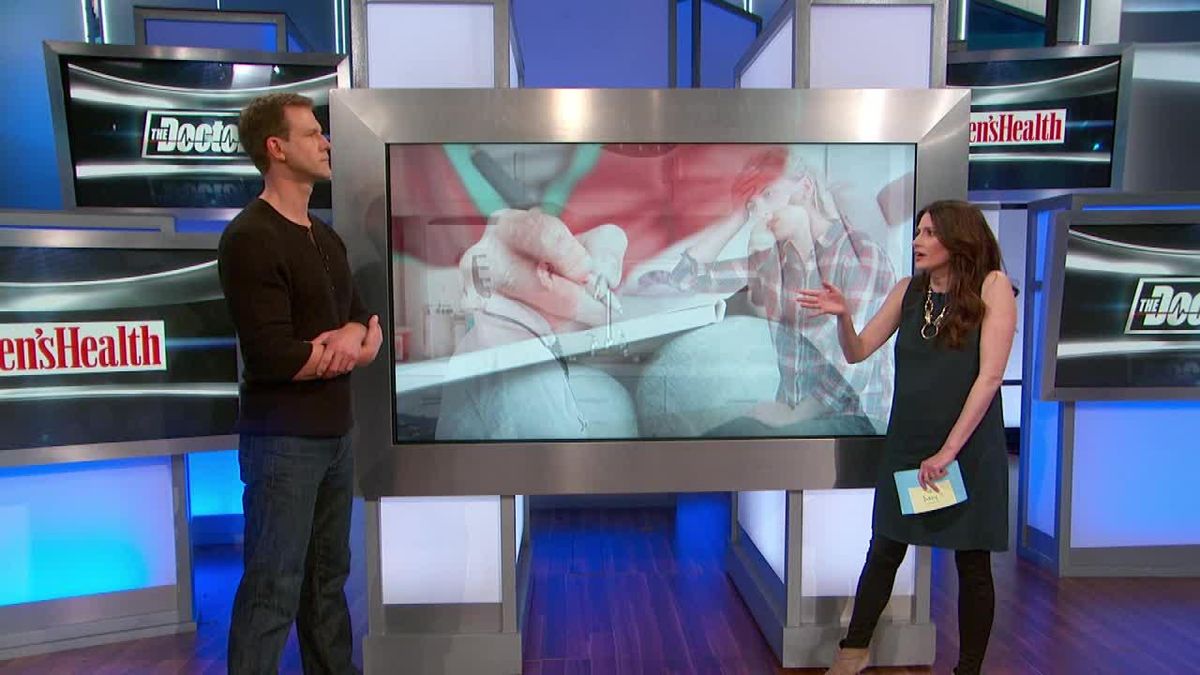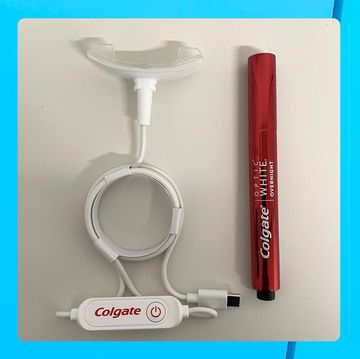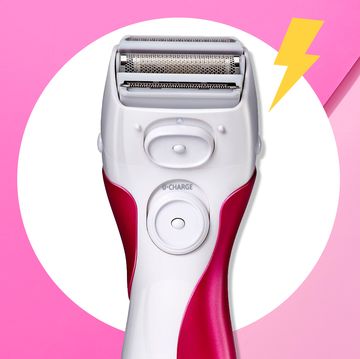Few nutrients—heck, few bees—are as buzzy as B12 right now. Juice bars are adding it to smoothies. Celebs like Rita Ora and Chelsea Handler get it injected into their bums. It's being touted as a magic bullet for everything from low energy to a sluggish metabolism, and it hit close to home at WH when three staffers were diagnosed with a B12 deficiency in a single week. We repeat: a single week!
Studies show that 15 percent of people are B12 deficient, and nearly 40 percent are borderline. That's a major loss, because the nutrient is a powerhouse—charged with helping to make DNA (no less!), keeping nerve and blood cells healthy, and helping to deliver fresh oxygen to organs. And when your body is tight on O2, you'll feel wiped out all the time, no matter how many Zs you log.
Yet many women with a deficiency go undiagnosed for not months, but years. Frustratingly, B12 levels aren't usually checked in routine blood work, and it's easy to chalk up symptoms of a deficiency to stress or busyness, says New York City nutritionist Robin Foroutan, R.D. So should you be supplementing?
A GROWING RISK
One reason B12 deficiencies seem to be blowing up? They're impacting two groups whose numbers are swelling. Most people take in enough B12 from natural sources—meat, fish, eggs, and dairy. That means vegetarians and vegans are most prone to lagging levels (up to 87 percent of the latter may be deficient). And with these dietary preferences on the rise—8 million people now identify as vegetarian and vegan, and Google Trends shows a 90 percent increase in searches for "vegan" in the past year—deficiencies could further mushroom.
A similar story is unfolding for women with gut troubles. That's because chronic gut inflammation—which comes with conditions like irritable bowel syndrome (IBS affects up to 45 million adults, two-thirds of them female), celiac disease, or Crohn's—limits the body's ability to absorb the nutrient. Heartburn sufferers often lack the nutrient too, since acid-reducing meds can limit the stomach acid needed to release B12 from food. If you fall into any of these groups, visit your GP, who can test your blood (most insurance plans will cover the cost if your doc prescribes it) and discuss ways to bring up your B12 levels.
These symptoms can get scary fast—going from mild to severe in as little as six months if untreated. If you notice any, see your doctor right away.
About half of people with a B12 deficiency lose papillae—tiny, taste bud-containing bumps. As a result, your tongue may feel sore, and your sense of taste may wilt, making even spicy fare seem bland.
A lack of B12 can deteriorate nerve cells, leading to a pins-and-needles sensation in your hands and feet. Ignore it, and the tingly feeling can become permanent, says Joshua Miller, Ph.D., a professor and chair of nutritional sciences at Rutgers University in New Brunswick, New Jersey.
(Kick-start your new, healthy routine with Women's Health's 12-Week Total-Body Transformation!)
Without the protection of B12, the nerves in the spinal cord (which branch out to control your legs) can wither, leaving you dizzy and wobbly. Stumbling regularly isn't normal unless you're teetering in sky-high heels, so report ongoing instances of feeling off-kilter as soon as you notice them, says Miller.
Find out what you MUST do the next time you go to the doctor:
Nerve damage in your brain can leave you foggy, confused, and forgetful. If you frequently blank on the name of your favorite restaurant or misplace your keys more often than usual, take it seriously and get tested. The mental misfires can progress quickly and become irreversible; some people develop symptoms so severe, they mimic dementia in a year's time, says Miller. (Don't panic: Docs say most younger people come in before true dementia-level symptoms set in.)
Related: 7 Brain Tumor Symptoms You Need To Know About
A lack of B12 can mess with your mental health and eventually can lead to depression or anxiety. One theory why: Low B12 may affect the production of mood-regulating neurotransmitters like serotonin and dopamine, the same brain chemicals impacted in depression that's not related to B12. If you feel low and there's no obvious stressors tanking your mood, talk to your M.D.
Related: Kelly Osbourne's 10-Year Lyme Disease Battle Left Her Feeling Like 'A Vegetable'
Large doses of folic acid—the vitamin all pregnant women need to take to prevent neural tube defects in their babies—can mask a B12 deficiency. Meaning, if you're swallowing folic acid, your doc might miss the obvious signs of low B12 until more serious neurological symptoms like difficulty walking or memory issues pop up, says Zhaoping Li, M.D., director of UCLA's Center for Human Nutrition. If you're expecting, ask your ob-gyn to test your vitamin levels when she does other blood tests.
Raise those levels with science-backed (and real women-tested) tactics. Pick your preference; all work equally well.
"When I found out I was deficient and started eating more foods high in B12, I had less fatigue and muscle weakness within a month." —Michele Baker, 45, Columbus, Ohio
Try it: Meat eaters and vegetarians alike can score the daily recommended 2.4 micrograms of B12 via food. Some of the best sources:
- 1 egg: 0.45 mcg
- 1 oz mozzarella: 0.65 mcg
- 3 oz beef tenderloin: 3.48 mcg
- 1 cup nonfat milk: 1.23 mcg
- 3 oz salmon: 2.38 mcg
- 3 oz tuna: 9.25 mcg
- 3 oz oysters: 5.75 mcg
- 1 cup Kashi Heart to Heart Honey Toasted Oat Cereal: 5.94 mcg
- 1 cup Kellogg's All-Bran Complete Wheat Flakes: 6.62 mcg
- 1 cup soy milk: 3 mcg
- 1 Tbsp Bragg Premium Nutritional Yeast Seasoning: 2.4 mcg
Related: The Scary Mental Health Risks of Going Meatless
"I'm a vegetarian, and I had been feeling a little shaky before I was told I wasn't getting enough B12. My doctor suggested I take a supplement; when I did, the dizziness stopped almost immediately." —Tiffany Hayden, 29, Thousand Oaks, California
Try it: Pop a daily 1,000-microgram supplement (unless your doc suggests a different dose). Research shows pills, gummies, and under-the-tongue dissolvable tabs are equally effective. Look for a USP or NSF seal on the packaging; this indicates an independent organization has verified the product contains the ingredient, in the stated amount, listed on the label.
"I have IBS and a range of food intolerances, so absorbing nutrients is tough for me. I've been getting B12 injections at my doctor's office for 10 years; I usually notice an uptick in my energy levels a few days after my doc gives the shot." —Zoe Macfarlane, 43, Los Angeles
Try it: Needles bypass the gut to deliver the nutrient straight to the muscle, so you may feel the effects as soon as the "juice" goes in or up to a few days after. Most women need the shots monthly to keep energy levels from flagging. If you've been diagnosed as deficient, you can get the jabs at your doctor's office or drugstore wellness clinics, and insurance will likely pay. If you haven't been diagnosed, don't buy into the fad. While taking in more B12 won't hurt you (you'll just pee out what you don't need), doctors suspect the energy lift some nondeficient people report feeling post-shot is just a placebo effect.
This article originally appeared in the September 2017 issue of Women's Health. For more great advice, pick up a copy of the issue on newsstands now!














